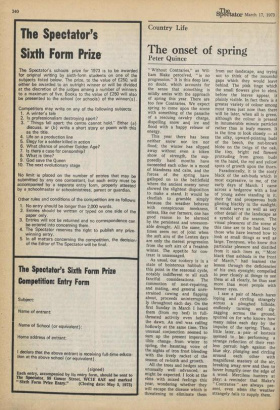The onset of spring
Peter Quince
" Without Contraries," as William Blake perceived, "is no progression." It is this deep law, no doubt, which accounts for the sense that something is mildly amiss with the approach of spring this year. There are too few Contraries. We expect spring to come upon the scene with something of the panache of a rescuing cavalry charge, dispelling snow and, ice and flood with a happy release of energy.
This year there has been neither snow nor ice nor flood; the winter has slipped away without even a token show of strength, the supposedly hard months have succeeded each other in a mood of blandness and calm, and the forces of the spring have galloped on to the battlefield where the ancient enemy never showed the slightest disposition to make a stand. It would be churlish to grumble simply because the weather behaves with conspicuous meekness, unless, like our farmers, one has good reason to be alarmed by the persistent and unseasonable drought. All the same, the times seem out of joint when the soft airs of the Lenten days are only the merest progression from the soft airs of a freakish winter. The appetite for contrast is unassuaged.
As usual, our rookery is in a state of boisterous hubbub at this point in the seasonal cycle, notably indifferent to all such fanciful considerations. The commotion of nest-repairing, and mating, and general unrestrained cawing and flapping about, proceeds uninterruptedly throughout each day. On the first Sunday in March I heard them (from my bed) in fullthroated activity even before the dawn. An owl was calling hollowly at the same time. This
unusual conjunction seemed to sum up the present impercep tible change from winter to spring, the haunting voice of the nights of iron frost blending with the lively racket of the season of re-birth and growth.
All the trees and hedges seem unusually well advanced, as might be expected. I look at the elms with mixed feelings this year, wondering whether they will escape the disease which is threatening to eliminate them from our landscape, and trying not to think of the mournful gaps which they would leave behind. The pink tinge which the small flowers give to elms, before the leaves appear, is plainly visible. In fact there is a greater variety of colour among most trees just now than there will be later, when all is green, although the colour is present in innumerable minute particles rather than in leafy masses. It is the time to look closely — at the silky, upward-pointing buds of the beech, the nut-brown blobs on the twigs of the oak, the tiny, bright red flowers protruding from green buds on the hazel, the red and yellow spots of growth upon the thorn. Paradoxically, it is the sooty black of the ash-buds which is most expressive, to me, of the early days of March. I came across a hedgerow with a line
of young ashes standing in it, their fat and prosperous buds glinting blackly in the sunlight; it would serve as well as any other detail of the landscape as a symbol of the season. The visual pleasures of the scene at this time are to be had best by those who have learned how to look at small things as well as large. Tennyson, who knew this particular pleasure and distilled from it such lines as, " More black than ashbuds in the front of March," had learned the lesson through the deficiencies of his own eyesight; compelled to peer closely at things to see them at all clearly, he thus saw more than most people with keener eyes.
I saw a pair of March hares loping and circling strangely across a ploughed hillside, endlessly turning and zigzagging across the ground, spurred on for who knows how many miles each day by the impulse of the spring. Then, a little later, a pair of kestrels seemed to be performing a strange reflection of their restless pursuit high against the blue sky, plunging and circling around each other with magnificent mastery of the air, breaking away now and then to hover hungrily over the edge of a wood. Merciless hunters at play: a reminder that Blake's " Contraries " are always present, even when the weather strangely fails to supply them.


































 Previous page
Previous page